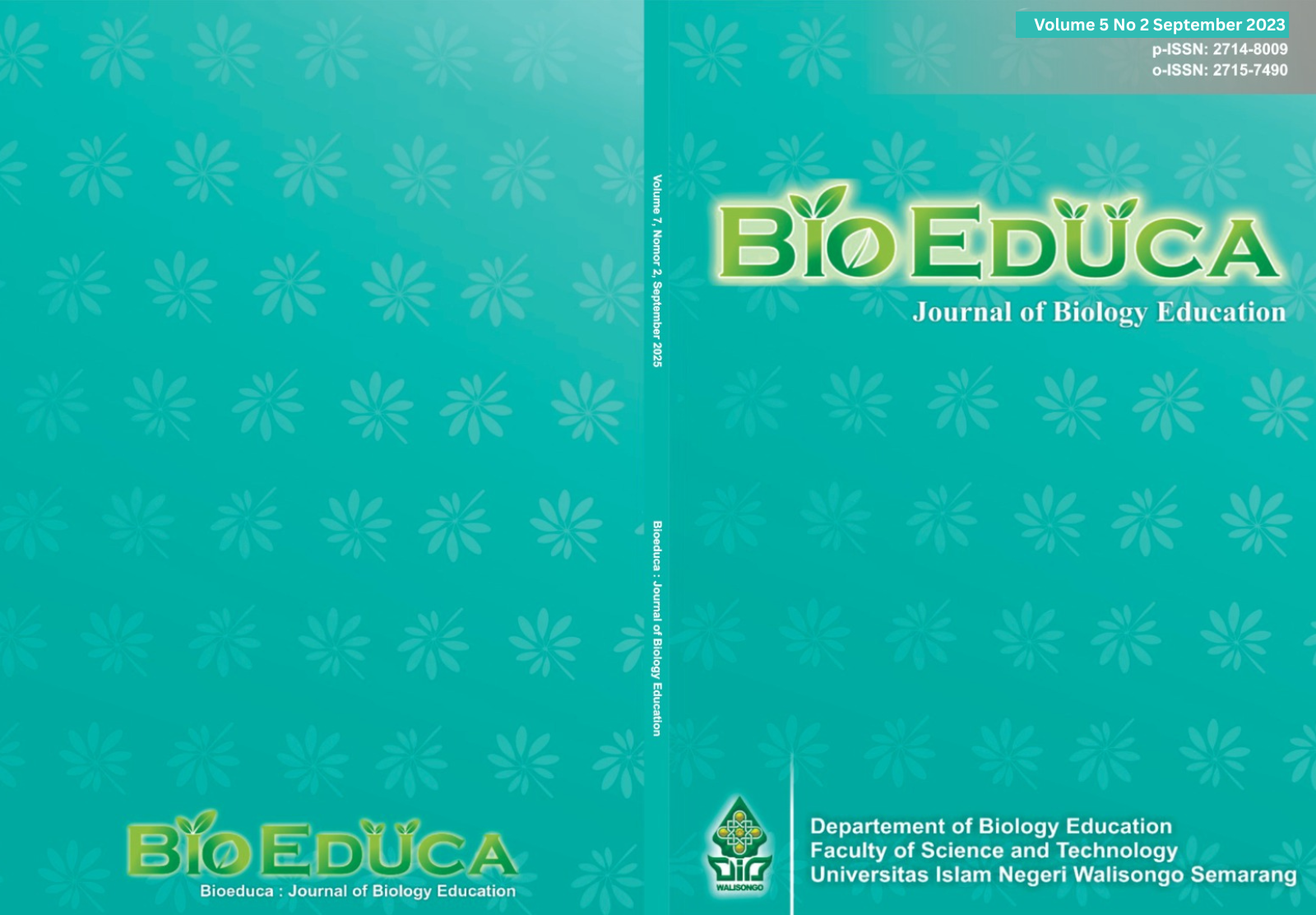Development of Biology E-Module Based on POGIL in Virus and Bacteria Material to Train HOTS X Graders of Senior High School
Main Article Content
Abstract
Higher-Order Thinking Skill (HOTS) is a skill that every individual needs to be able to solve problems quickly, critically, and logically. The condition of HOTS in Indonesia is still low. This study aims to create and assess the feasibility of E-module biology based on POGIL on viral and bacterial materials. This study uses the 4D development model (Define, Design, Develop, and Disseminate but is limited to the Development stage. The product trial sample on 42 science students of grade X was taken randomly. The validation results from media experts, POGIL experts, material experts, HOTS experts, and biology teachers, namely, 83.3%, 85%, 82.5%, 86.2%, and 88.6%. The overall results from the expert validation are of very decent quality. The student's responses regarding the E-module based on POGIL on the virus and bacteria material obtained a mark of 85.3%, which included the very decent category. E-module is a feasible type to be applied as a learning resource for X senior high school grades.
Downloads
Article Details
The copyright of the received article shall be assigned to the journal as the publisher of the journal. The intended copyright includes the right to publish the article in various forms (including reprints). The journal maintains the publishing rights to the published articles. Authors are allowed to use their articles for any legal purposes deemed necessary without written permission from the journal with an acknowledgment of initial publication to this journal.

This work is licensed under a Creative Commons Attribution-ShareAlike 4.0 International License.
References
Anderson, L.W. and Krathwohl, D.R. (2015) Kerangka Landasan Untuk Pembelajaran, Pengajaran, Dan Asesmen Revisi Taksonomi Pendidikan Bloom. Terjemahan. Agung Prihanto. Yogyakarta: Pustaka Belajar.
Anggriani, L., Diana, N. and Latifah, S. (2019) ‘Pengembangan modul fisika berbasis’, Skripsi, 2(2), pp. 177–184.
Arifiyyati, M.F., Rofi’ah, N.L. and Listyono, L. (2023) ‘Correlation between scientific literacy with higher order thinking skills and self-efficacy in biology learning’, Jurnal Biolokus: Jurnal Penelitian Pendidikan Biologi dan Biologi, 5(2), pp. 166–176.
Badjeber, R. et al. (2018) ‘Pengembangan Higher Order Thinking Skills’, Jurnal Pendidikan dan Pembelajaran, 1(1), pp. 36–43.
Cahyaningrum, R.D., Nurjayadi, M. and Rahman, A. (2017) ‘Pengembangan E-Module Kimia Berbasis Pogil (Process Oriented Guided Inquiry Learning) Pada Materi Reaksi Reduksi-Oksidasi Sebagai Sumber Belajar Siswa’, JRPK: Jurnal Riset Pendidikan Kimia, 7(1), pp. 59–65. Available at: https://doi.org/10.21009/jrpk.071.07.
Ernawati, I. (2017) ‘Uji Kelayakan Media Pembelajaran Interaktif Pada Mata Pelajaran Administrasi Server’, Elinvo (Electronics, Informatics, and Vocational Education), 2(2), pp. 204–210. Available at: https://doi.org/10.21831/elinvo.v2i2.17315.
Farda, H., Zaenuri and Sugiarto (2017) ‘Keefektifan Model Pembelajaran POGIL Bernuansa Etnomatematika Berbantuan LKPD terhadap Kemampuan Komunikasi Matematis Siswa’, Unnes Journal of Mathematics Education, 6(2), pp. 223–230. Available at: https://doi.org/10.15294/ujme.v6i2.15812.
Fathurrohmi, U. (2019) ‘Pengembangan E-Modul Biologi Berbasis Kvisoft Flipbook Maker pada Materi Fungi untuk Memberdayakan Berpikir Tingkat Tinggi Siswa Kelas X di SMAN 11 Bandar Lampung’, Journal of Chemical Information and Modeling, 53(9), pp. 1–77.
Herawati, N.S. and Muhtadi, A. (2018) ‘Developing Interactive Chemistry E-Modul For The Second Grade Students of Senior High School’, Jurnal Inovasi Teknologi Pendidikan, 5(2), pp. 180–191.
Irawan, D. (2017) ‘Pengembangan Media Permainan (Game) Monopoli Pada Pembelajaran Fisika Materi Besaran Dan Satuan Pada Tingkat Sekolah Menengah Pertama (SMP)’, UIN Ar-RAniry, 2(1), p. 22.
Masnur, M. and Syaparuddin, S. (2019) ‘The Effect of POGIL Learning Model on HOTS Students of Elementary School Teacher Education Program’, Edumaspul: Jurnal Pendidikan, 3(2), pp. 87–92. Available at: https://doi.org/10.33487/edumaspul.v3i2.145.
Misbah, Wati, M. and Anggraini, P. (2015) ‘Perbedaan Hasil Belajar Antara Model Guided Discovery Learning Dengan Model Process Oriented Guided Inquiry Learning (POGIL) Di SMP Negeri 1 Banjarmasin’, in Prosiding Seminar Nasional Pendidikan Inovasi Pembelajaran Fisika, IPA dan Ilmu Fisika dalam Menyiapkan Generasi Emas 2045, pp. 231–238.
Mubarak, H.A.Z. (2018) Inspiring Factual Education: Pendidikan Faktual yang Menginspirasi. zakimu.com. Available at: https://books.google.co.id/books?id=kza8DwAAQBAJ.
Rahayu, H.A., Ashadi, A. and Utomo, S.B. (2019) ‘Penerapan Process-Oriented Guided Inquiry Learning (POGIL) untuk Meningkatkan Keterampilan Generik Sains dan Prestasi Belajar Siswa pada Materi Larutan Penyangga’, Jurnal Pendidikan Kimia, 8(2), p. 161. Available at: https://doi.org/10.20961/jpkim.v8i2.25192.
Sasmita, S., Medriati, R. and Hamdani, D. (2021) ‘Pengembangan E-Modul Berbasis Process Oriented Guided Inquiry Learning Materi Rangkaian Arus Bolak-Balik (Ac) Untuk Melatihkan Kemampuan Berfikir Kritis Siswa Sma’, DIKSAINS : Jurnal Ilmiah Pendidikan Sains, 2(1), pp. 1–14. Available at: https://doi.org/10.33369/diksains.2.1.1-14.
Savira, Y.M., Budi, A.S. and Supriyati, Y. (2019) ‘Pengembangan E-Modul Materi Momentum Dan Impuls Berbasis Process Oriented Guided Inquiry Learning (Pogil) Untuk Meningkatkan Kemampuan Berpikir Tingkat Tinggi Siswa Sma Kelas X’, VIII, pp. SNF2019-PE-25–36. Available at: https://doi.org/10.21009/03.snf2019.01.pe.04.
Sugiyono (2013) Metode Penelitian Pendidikan: Pendekatan Kuantitatif, Kualitatif dan R&D. Bandung: Alfabeta.
Sulasmi, N.M.T., Rati, N.W. and Japa, G.N. (2018) ‘Pengaruh Model Pembelajaran Pogil Berbantuan Media Kelas V Sd’, 1(2), pp. 139–148.
Syafitri, Y. et al. (2019) ‘Pembuatan E-Modul Berorientasi Higher Order Thinking Skills ( HOTS ) Untuk Pembelajaran Fisika Pada Materi Kalor Dan Teori Staf Pengajar Jurusan Fisika , FMIPA Universitas Negeri Padang’, Pillar of Physics Education, 12(4), pp. 777–784.
Wahjusaputri, S. and Purwanto, A. (2022) Statistika Pendidikan Teori dan Aplikasi. CV. Bintang Semesta Media.

